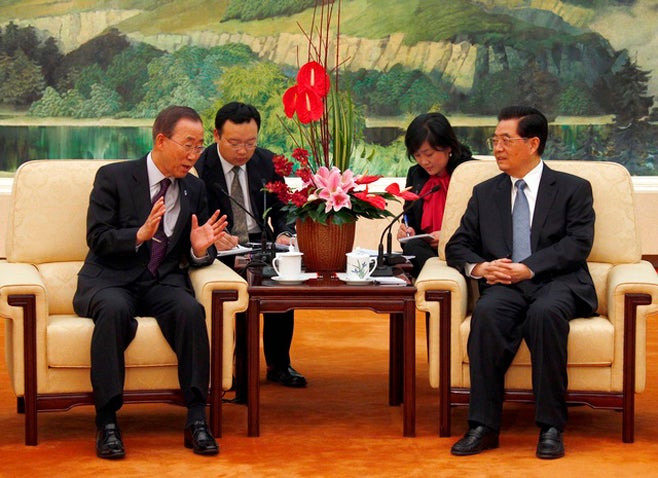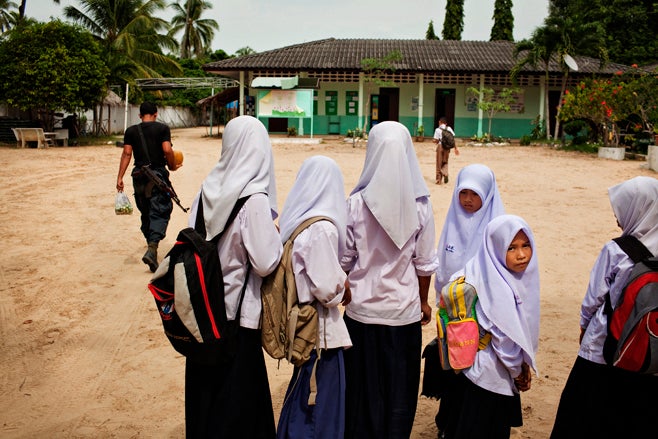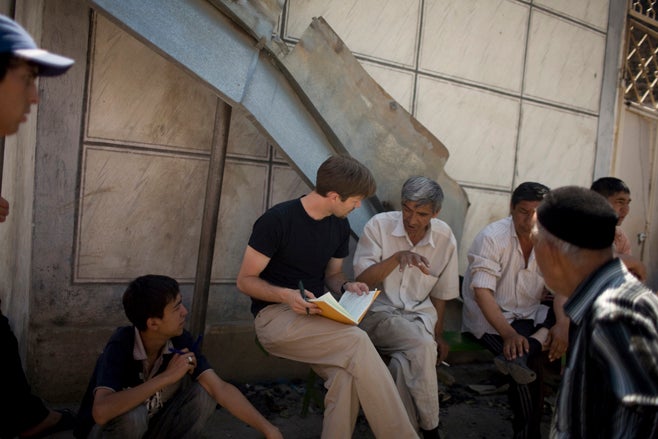The protracted political crisis in Bosnia and Herzegovina continued to stall necessary reforms in 2010, including constitutional changes initiated after a ruling by the European Court of Human Rights (ECtHR) that eligibility restrictions for political candidates discriminate against ethnic minorities. Effective local war crimes prosecutions were again a bright spot, but the intimidation of independent journalists, the slow rate of return of refugees and internally displaced persons (IDPs), and the arbitrary detention of national security suspects continued to stain the country's human rights record.
War Crimes Accountability
The pace of war crime trials continued to be good on both central and local (both cantonal and municipal) levels, despite practical impediments, such as staffing and funding shortages, and political sensitivities surrounding the topic. On July 11, 2010, the remains of 775 victims of the Srebrenica massacre were buried in the Potocari area, at a ceremony marking the 15th anniversary of the worst atrocity in Europe since World War II. Ratko Mladic, an indicted architect of the massacre, remains at large. Another indicted architect, Radovan Karadzic, faced trial at the International Criminal Tribunal for the former Yugoslavia (ICTY). Karadzic made his opening statement in March and the prosecution began presenting its case in April.
In June the ICTY convicted Vujadin Popovic and Ljubisa Beara, two high-ranking Bosnian Serb army officials, of genocide, murder, extermination, and persecution for their roles in the massacre at Srebrenica, sentencing them to life imprisonment. A third defendant, Drago Nikolic, was convicted of aiding and abetting genocide, murder, extermination, and persecution, and sentenced to 35 years in prison. Four others were also convicted of a range of crimes committed during and following the fall of Srebrenica and Zepa.
The War Crimes Chamber in Sarajevo continued to prioritize the most serious cases of war crimes and crimes against humanity, and reached final verdicts in eight cases between November 2009 and September 2010, bringing its total number of completed cases to 46. Sixteen new cases began during this period, with 53 ongoing trials as of September 2010.
Local courts in the Federation of Bosnia and Herzegovina commenced five war crimes cases and issued verdicts in three cases between November 2009 and September 2010. During the same period Republika Srpska local courts began six cases and completed eight, and Brcko District began two new cases. According to the national war crimes strategy, the most sensitive and serious cases are to be tried centrally, while less controversial and complex ones are to be handled at municipal and canton levels.
Return of Refugees and Internally Displaced Persons
The return of refugees and IDPs to their areas of origin remained slow, and the Office of the United Nations High Commissioner for Refugees (UNHCR) registered the return of only 181 refugees and 177 IDPs during the first six months of 2010. As of June 2010 there were more than 113,465 registered IDPs (including some 7,000 in collective centers): 48,659 in the Federation, 64,560 in Republika Srpska and 246 in Brcko. There are no reliable estimates of the number of refugees outside Bosnia.
Lack of economic opportunity, inadequate housing, and people's reluctance to return to areas where most residents are of a different ethnicity remain the key impediments to return. As of September 2010 Bosnia hosted 129 Kosovo Roma under temporary protection status.
In June the House of Peoples (the upper house of parliament) amended the national returns strategy to reflect the current challenges to returns of the remaining displaced, designating 2014 as the year by which displaced people should be given housing or financially compensated. The strategy also reiterates the need to provide more livelihood opportunities and maintain security for returnees.
National Security and Human Rights
Seven North African and Middle Eastern men were subject to indefinite detention without charge on national security grounds during 2010. At least five of the men had been previously stripped of their acquired Bosnian nationality. In February, Omar Frendi, an Algerian detainee, accepted voluntary departure to Algeria. A second Algerian, Noureddine Gaci, was detained in June; an Egyptian, Muhamed Elfarhati Othman, was detained in October; and in August, in the case of Imad Husin-a Syrian who remains in detention-the ECtHR indicated that it might intervene if Husin was not charged or released by years' end, despite the court's earlier intervention in 2008.
In June a bomb exploded at a police station in the town of Bugojno, killing one police officer and injuring six others. One of seven men subsequently arrested confessed to planting explosives and at this writing is in detention awaiting trial with two others whom were arrested later.
Ethnic and Religious Discrimination in the Political System
October general elections were organized in direct contravention of a binding December 2009 ruling by the Grand Chamber of the ECtHR in the case of Sejdic and Finci v Bosnia Herzegovina. The court ruled that the inability of the applicants-a Jew and a Roma- to stand for the presidency or the House of Peoples in Bosnia and Herzegovina amounted to illegal discrimination, and called on Bosnia to make constitutional and electoral reforms to remove discriminatory provisions and allow candidates who are not Serb, Bosniak, or Croat.
Media Freedom
Threats and harassment of independent journalists continued throughout 2010. In February a policeman verbally and physically assaulted Osman Drina, a reporter for Independent Television IC (Nezavisna Televizja IC), while he was reporting on a sporting event. The Ministry of Interior opened an investigation into this incident, which is still ongoing at this writing.
In March a car belonging to Rade Tesic, a journalist for the Euroblic daily newspaper, was burned while parked near Tesic's house in Doboj. No one was injured in the attack. The editorial staff of Euroblic also received several anonymous, threatening phone calls in March regarding Tesic's articles about the activities of local criminal networks.
Bakir Hadziomerovic, the editor in chief of the popular "60 Minutes" TV program, which exposes links between politicians and organized crime, received repeated anonymous death threats against him and his family in writing and by telephone. Police opened an investigation and inspected the program's premises, but at this writing has made no arrests in the case.
Human Rights Defenders
No attacks on human rights defenders were recorded in 2010. The community of lesbian, gay, bisexual, and transgender rights defenders, including Association Q, the main LGBT organization, maintain a low profile and remain weak and vulnerable to intimidation and harassment.
International Actors
The combined Office of the High Representative/European Union Special Representative, backed by the United States and the Peace Implementation Council continue to focus on assisting the country to overcome the protracted political stalemate and forge closer integration with the EU.
An April high-level meeting between US Deputy Secretary of State James Steinberg, Spanish Foreign Minister Miguel Angel Moratinos (whose country then held the EU rotating presidency), and key Bosnia and Herzegovina politicians in Butmir failed to produce significant results, with Bosnian leaders unwilling to support any transfer of power from the governments of the Federation and Republika Srpska to the central government ahead of the October elections. The success of ethnic nationalist parties in the elections underscored the obstacles to such reform.
During a March visit to Bosnia Jean-Charles Gardetto, the Council of Europe Parliamentary Assembly (PACE) rapporteur, identified witness protection as a key challenge to accountability for war crimes in Bosnia and Herzegovina. This concern was echoed in a report by the OSCE Mission to Bosnia and Herzegovina, released in May, which called on the Bosnian authorities to do more to protect witnesses in war crime trials from harassment and violence. PACE also adopted resolutions on the functioning of democratic institutions in Bosnia in January and April, highlighting the urgent need for constitutional reform, and sent a pre-election assessment mission to the country in September.
In February Bosnia and Herzegovina was subject to Universal Periodic Review by the UN Human Rights Council. Recommendations included the need to implement constitutional reforms, address the continued lack of sustainable financial and social support for the internally displaced, respond adequately to threats and attacks against independent journalists, and remove the death penalty from the constitution of Republika Srpska.
The European Commission's annual progress report, released in November, criticized Bosnia and Herzegovina for failing to implement constitutional reforms, the slow pace of reforms of the justice and penitentiary systems, and political interference and pressure on independent media. The EU commended ongoing efforts to process remaining war crimes cases and cooperation with the ICTY and highlighted improvement in the government's efforts to facilitate the return of remaining IDPs and refugees.



